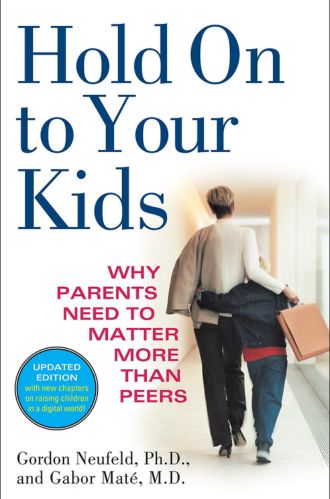In this book review of Hold On To Your Kids, we dive deep into the thought-provoking work of Gordon Neufeld and Gabor Mate.
The book explores the negative impact of peer orientation (when children become more attached to their peers than their parents) on children, the importance of maintaining strong parent-child relationships and offers practical advice for parents to navigate this complex landscape.
We’ll be taking an in-depth look at the authors’ arguments, insights, and proposed strategies.
This book features in our best attachment parenting books article.
Table of Contents
Introduction
“Hold On to Your Kids” is a compelling book that addresses the critical issue of children becoming overly dependent on their peers, which can lead to long-term negative consequences.
The authors, Neufeld and Maté, bring their expertise in psychology, anthropology, neurology, and personal experience to understand this phenomenon comprehensively. In particular, they explore and advise on the impact an attachment parenting style has on reducing the critical issue of peer dependency.

The book has received high praise from readers, who describe it as essential reading for every parent. The authors’ approach has been applauded for being well-written, practical, and thought-provoking, giving parents the tools to fulfill their instinctual roles in their children’s lives.
Pros and Cons
Pros:
- Comprehensive analysis of peer orientation and its impact on children.
- Practical suggestions for parenting to combat negative effects of peer culture.
- Integrates various disciplines, such as psychology, anthropology, and neurology, for a holistic understanding.
- Addresses the role of teachers and schools in fostering healthy relationships.
Cons:
- The book’s first half can be repetitive and boring for some readers.
- The academic writing style may be difficult for some to comprehend.
- Could have further explored the role of technology and social media in exacerbating peer orientation.
Hold On To Your Kids Overview and Key Concepts
The central theme of “Hold Onto Your Kids” revolves around the negative impact of peer-oriented dependency on children. Neufeld and Maté argue that peer culture has become dominant in today’s society, leading to a decrease in parental influence and a rise in peer dependency.
This, in turn, can result in negative consequences such as alienation, conformity, and sexualization. One of the quotes from the book highlights this problem: “What to us looks like independence is really just dependence transferred. We are in such a hurry for our children to be able to do things themselves that we do not see just how dependent they really are.”
The authors draw on research from various disciplines to support their arguments, providing readers with a well-rounded understanding.
We found, from this book review of Hold On To Your Kids, that the key concepts could be summarized as follows:
- Attachment: The book emphasizes the importance of attachment in child development. Attachment is the emotional bond children form with their caregivers, providing them with a sense of security and helping them regulate their emotions.
- Peer Orientation: The authors argue that in modern society, children are increasingly influenced by their peers and are at risk of becoming more attached to their peers than their parents. This is known as peer orientation, resulting in children depending on peers to form their moral compasses.
- Parenting Strategies: The book provides practical strategies for parents to strengthen their relationship with their children and foster healthy attachment. These strategies include emotional availability, playfulness, guidance, and staying connected with their children.
- Separation: The authors also discuss separation challenges in modern society, such as parents working long hours or traveling frequently. They argue that separation can be stressful for both parents and children and offer advice on managing separation to support healthy attachment.
- The Importance of Community: Finally, the book emphasizes the importance of community in supporting healthy child development. The authors argue that parents cannot do it alone and that it takes a village to raise a child. They encourage parents to seek community support through extended family, friends, or other organizations.
The book provides a holistic approach to understanding child development. It offers practical strategies for parents and caregivers to build healthy relationships with children and foster their emotional well-being.
They also address the role of schools and teachers in fostering healthy relationships between children and their peers, emphasizing that educators play a vital part in shaping children’s development.
Strategies and Practical Advice
Neufeld and Maté provide practical advice and solutions for parents, emphasizing the importance of maintaining strong bonds with their children to counteract the negative effects of peer culture. As the authors state, “The key to activating maturation is to take care of the child’s attachment needs.
To foster independence we must first invite dependence; to promote individuation we must provide a sense of belonging and unity; to help the child separate we must assume the responsibility for keeping the child close.” This approach highlights the significance of nurturing the parent-child relationship to promote healthy growth and development.
In addition to the practical strategies for parents, the authors also discuss the importance of teachers in children’s lives. They emphasize, “Children learn best when they like their teacher and think their teacher likes them.” This insight can be applied to both the classroom environment and the parent-child relationship, as the same principles hold true in both contexts.
According to the authors, strengthening the parent-child relationship can prevent or reverse peer orientation. They suggest several ways parents can do this:
- Be emotionally present: Parents should be emotionally present and available to their children, showing interest in their feelings and experiences.
- Be playful: Parents can connect with their children through play, humor, and shared activities.
- Create rituals: Establishing rituals, such as bedtime routines, family dinners, or weekend outings, can help strengthen the bond between parent and child.
- Provide guidance: Parents should provide guidance and support for their children, setting limits and boundaries lovingly and respectfully.
- Stay connected: Parents should stay connected with their children, even as they grow older and become more independent, by maintaining open communication and showing interest in their lives.

By implementing these strategies, parents can help shift their child’s attachment from peers back to the parent, creating a strong and healthy parent-child relationship.
Criticisms and Omissions
While “Hold On to Your Kids” has been well-received by many readers, it is not without criticisms. Some readers find the book’s first half repetitive and dull, while others struggle with the academic writing style. However, most readers agree that the second half of the book, which offers solutions to the problem of peer orientation, is more engaging and thought-provoking.
Regarding omissions, the book could have further explored the role of technology and social media in exacerbating peer orientation and provided additional guidance on how parents can address these issues in the digital age. As technology evolves rapidly, parents must understand its impact on their children’s lives and relationships.
Who Should Read Hold On To Your Kids
“Hold On to Your Kids” is a must-read for parents and caregivers who want to understand the impact of peer culture on their children and develop strategies to foster strong parent-child relationships.
If you are interested in adopting an attachment parenting style or are already on this journey, this book is a valuable reference for the specific circumstance of peer culture.
It is also a valuable resource for educators, mental health professionals, and anyone interested in the well-being of children.
Conclusion
To summarise this book review of Hold On to Your Kids: Why Parents Need to Matter More Than Peers, we feel it is an insightful and thought-provoking book that sheds light on peer orientation’s dangers and offers practical application advice for parents.
The book provides a comprehensive understanding of the issue, drawing on various disciplines and offering practical strategies for maintaining strong parent-child relationships.
Despite some criticisms regarding repetitiveness and writing style, the book remains an essential read for anyone concerned about the influence of peer culture on children and the importance of strong parental attachment.
As the authors remind us, “Children do not experience our intentions, no matter how heartfelt. They experience what we manifest in tone and behavior.” This important message encourages parents to be mindful of their actions and prioritize nurturing the parent-child relationship.
Related Book Reviews:
Review of The Attachment Parenting Book by William and Martha Sears

